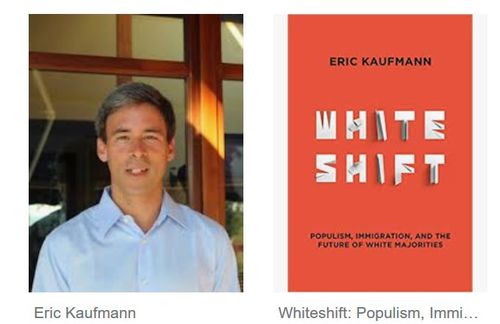
Eric Kaufmann’s WHITESHIFT On Brimelow, O’Sullivan And The Paleos
05/29/2019
Eric Kaufmann’s book Whiteshift: Populism, Immigration and the Future of White Majoritiesincludes a section on the immigration wars of the ‘90s, featuring VDARE.com editor Peter Brimelow and former National Review editor John O’sullivan, both of whom were purged by Bill Buckley.

Immigration and ethno-traditionalism are central to understanding the neocon–paleocon split. As the country became more diverse, a number of paleoconservative voices emerged warning that the country was on the verge of losing its ethnic traditions. In The Path to National Suicide (1987), Lawrence Auster, a Jewish-American who converted to Episcopalianism and subsequently to Catholicism wrote:
The very manner in which the [immigration] issue is framed — as a matter of equal rights and the blessings of diversity on one side, versus “racism” on the other — tends to cut off all rational discourse on the subject … Instead of saying: “We believe in the equal and unlimited right of all people to immigrate to the U.S. and enrich our land with their diversity,” what if they said: “We believe in an immigration policy which must result in a staggering increase in our population, a revolution in our culture and way of life, and the gradual submergence of our current population by Hispanic and Caribbean and Asian peoples.” Such frankness would open up an honest debate between those who favor a radical change in America’s ethnic and cultural identity and those who think this nation should preserve its way of life and its predominant, European-American character.
Auster in turn influenced Peter Brimelow, an expatriate Briton and National Review editor whose Alien Nation (1995) became a widely discussed bestseller. Brimelow described the country as having a “white” ethnic core. “It is simply common sense that Americans have a legitimate interest in their country’s racial balance,” he argued. “They have a right to insist that their government stop shifting it. Indeed, it seems to me that they have a right to insist that it be shifted back.” [Footnoted to Alien Nation,p. 264] Brimelow argued against American exceptionalism, stating that the US was “a nation like any other” with a historic white core. Brimelow formed part of a congeries of paleoconservative intellectuals including Chilton Williamson and Washington Times columnist Samuel Francis. To their right, the paleoconservatives had connections to white nationalist Jared Taylor. In 1990 Taylor founded American Renaissance magazine and in 1999 Brimelow established VDare, an anti-immigration website. Both are seminal influences on today’s internet-based white nationalist movement which forms the core of today’s alternative right, or “alt right”. [Footnoted to George Hawley’s Making Sense of the Alt-Right, p. 27]
Neoconservatives preferred to endorse American exceptionalism, the idea that the US was a new type of post-ethnic nation. Most came to approve of Official English, opposed affirmative action and bilingual education and endorsed the need for immigrants to embrace a positive view of American history. They focused squarely on the creedal elements in the national repertoire. Francis Fukuyama, whom I interviewed soon after Brimelow’s book came out, saw value in the country’s ethno-traditions, thus deviating from the missionary nationalism of the neoconservatives. He argued that English was key for assimilation and traced the country’s founding to its Anglo-Protestant forebears. Where Fukuyama was critical of paleoconservatism was over Brimelow’s emphasis on a “white” ethnic core rather than an Anglo-Protestant cultural inheritance which could be readily adopted by citizens of any background. Fukuyama was also of the view that immigration was not a growing issue in American politics, a position disputed by National Review editor John O’Sullivan, whom I also spoke to at the time. [Footnoted to Kaufmann’s own book Rise and Fall of Anglo-America, pp. 278–9] Fukuyama was right: O’ Sullivan was two decades early. [Links added]
O’sullivan was only too early because the GOP, which kept losing elections, refused to listen.
